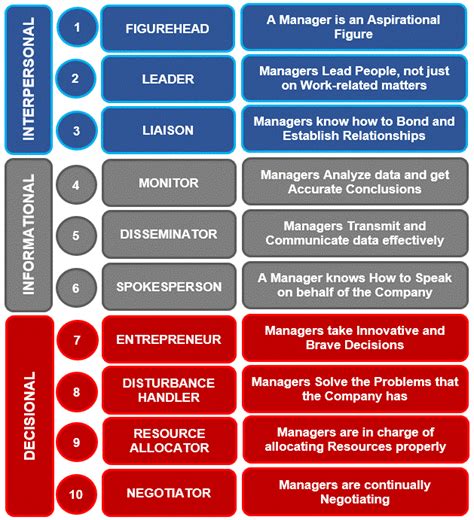The 10 Leadership Roles Of Great Managers

Being a great manager requires more than just overseeing a team or department. It involves taking on multiple leadership roles to inspire, guide, and empower your team members. By understanding and implementing these roles, you can create a positive work environment and drive your team towards success. Here are the 10 leadership roles of great managers:
1. Visionary
Great managers have a clear vision of where they want their team to go. They set goals and articulate a compelling vision that inspires their team members. They communicate this vision effectively, ensuring that everyone understands and aligns their work towards achieving it.
2. Coach
A great manager acts as a coach to their team members. They provide guidance, support, and constructive feedback to help individuals grow and develop their skills. They recognize each person’s strengths and weaknesses and provide opportunities for improvement.
3. Communicator
Effective communication is key to being a great manager. Managers must be able to convey information clearly, listen actively to their team members, and foster open and transparent communication within the team. They ensure that everyone is on the same page and understands expectations.
4. Decision-Maker
Managers are responsible for making important decisions that impact their team and organization. They gather information, analyze options, and make well-informed decisions in a timely manner. They consider the input of their team members but understand that the final decision rests with them.
5. Problem-Solver
Great managers are adept at solving problems and overcoming challenges. They approach problems with a positive mindset and seek creative solutions. They involve their team members in problem-solving processes and empower them to contribute their ideas and expertise.
6. Motivator
Managers play a crucial role in motivating their team members. They recognize and celebrate achievements, provide encouragement and support, and create a positive and inspiring work environment. They understand the unique motivations of each individual and tailor their approach accordingly.
7. Mentor
A great manager acts as a mentor to their team members, guiding them in their professional development. They share their knowledge and experience, provide advice and guidance, and help individuals enhance their skills and reach their full potential.
8. Team Builder
Building a cohesive and high-performing team is a key role of a great manager. They create a sense of unity and collaboration among team members, foster a positive team culture, and ensure that everyone feels valued and included. They also identify and address any conflicts or issues within the team.
9. Advocate
Managers advocate for their team members, ensuring they have the resources, support, and opportunities they need to succeed. They represent their team’s interests and provide a voice for their members. They also promote their team’s achievements and contributions to the wider organization.
10. Continuous Learner
Great managers understand the importance of continuous learning and growth. They stay updated with industry trends and developments, seek feedback and opportunities for improvement, and invest in their own professional development. They lead by example and inspire their team members to embrace a growth mindset.
Conclusion
Being a great manager requires taking on multiple leadership roles. By being a visionary, coach, communicator, decision-maker, problem-solver, motivator, mentor, team builder, advocate, and continuous learner, you can effectively lead your team towards success.
Frequently Asked Questions
- What qualities make a great manager?
- How can I improve my leadership skills?
- What is the role of a manager in a team?
- How can a manager be an effective communicator?
- How can a manager motivate their team?
A great manager possesses qualities such as strong communication skills, empathy, adaptability, problem-solving abilities, and the ability to motivate and inspire others.
To improve your leadership skills, you can seek feedback from your team members and colleagues, take leadership courses or workshops, read books on leadership, and practice self-reflection and self-improvement.
The role of a manager in a team is to provide guidance, support, and direction to team members, oversee the completion of tasks and projects, foster a positive work environment, and ensure the team’s goals are met.
A manager can be an effective communicator by being clear and concise in their communication, actively listening to their team members, providing regular updates and feedback, and fostering open and transparent communication within the team.
A manager can motivate their team by recognizing and celebrating achievements, providing feedback and encouragement, setting clear goals and expectations, creating a positive work environment, and offering opportunities for growth and development.
